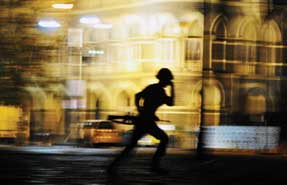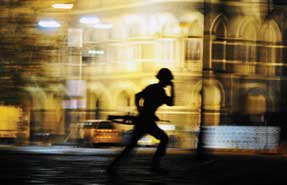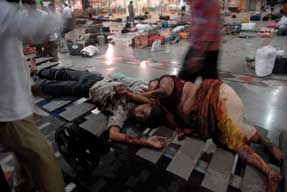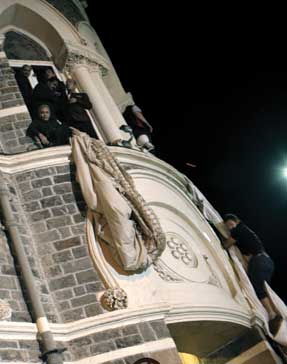India
India's 9/11?

We need to resist facile parallels between the events in Mumbai and 9/11.
|
The terrorist attacks in Mumbai in late November are shocking for their brazenness. Supposedly, 10 terrorists landed on a hijacked boat off the docks in Mumbai after 9 p.m. on Nov. 26, ambled into the city like cowboys in an urban Western, burning taxies they rode in, shooting police officials and mowing down passengers at the major train terminal. They killed anyone who crossed their path, then sprayed bullets at diners at Café Leopold, a favorite hangouts of hip youngsters and foreigners. Two of them proceeded to commandeer the Taj Hotel, two others the nearby Chabad House, killing a Jewish Rabbi and his wife, and two others the Oberoi-Trident Hotel on Marine Drive. For the next three days, they held hostages, shot anyone who protested, and torched the hotels as the 24-7 news channels in India and the U.S. captured the spectacle of horror.
Whoever planned these attacks must think them spectacularly successful. And they were. Pakistani journalist Ahmed Rashid has said that the current wave of terrorism has a strategic purpose (and that Bin Laden may be providing its overall vision). When the planes crashed into the World Trade Centers in New York, we were shocked by the ingenuousness of a rag tag group of terrorists in launching an attack against one of the most fortified societies in the world. The idea of using our own planes to crash into our buildings was both economical and brilliant in the annals of terrorism. The years since have spawned new novel tools of terror: suicide bombers, cell phone triggers to blow up trains, IED (improvised explosive devices) and firebombing of night clubs. The Mumbai attacks open a new chapter in terrorism. The planners must have known that the attackers would face little resistance. The chief of Maharashtra’s anti terrorism task force, Hemant Karkare, was gunned down, along with his deputies, at the Cama Hospital. Instead of guiding defenses from a control room, he was on the front line. Police lacked even rudimentary weapons as most were armed only with sticks. TV footage showed Indian police running scared as the terrorists stalked them. What could be scarier for a citizen in an open society. That incalculable harm could be caused in India with simple acts of violence is not surprising. India is a remarkably porous society and one rarely views a neighbor with suspicion. Indeed, it would be impossible to erect public safeguards to protect people in India. But it should not be difficult to launch a defense against an attack, impending or in motion, of this sort. That it could not be done is an integral part of this tragedy. In the 60 hours that the world was riveted by the ravages of a handful of terrorists, the incompetence of the police, the State, and the intelligence services was laid bare. It was a moment of national shame. What we lost were not just human lives and property, but faith and trust in the apparatus of the State to defend its people. Make no mistake,mistake; Indians have entered a new era of fear. Terrorism in India Violence and terrorism are not new to India. By some estimates, India ranks second only after Iraq in casualties this year from domestic terrorism, assassinations and attacks by foreign terrorists on Indian soil. Religious fundamentalism is the main cause, but extremism not rooted in religion is also responsible for terrorism and killings in India. The Mumbai attack is different, because now India has been thrust into a new phase of world terror. Mumbai was an experiment the terrorists conducted to test new tactics, with a larger strategic plan to expand terrorism in South Asia. Our response – not simply the act – will determine its meaning and the implications for the future of terrorism in the subcontinent.
The author Christopher Hitchens in Slate magazine urged U. S. politicians to avoid “anemic and insipid” statements about the events, observing that “it is human nature to mention any personal connection while offering solidarity,” with the people suffering from tragedy. Often these personal connections contribute to the “anemic and insipid” dispositions. Take Suketu Mehta, author of Maximum City, a much-celebrated book on Mumbai, for example. Writing in the New York Times, just as the events were winding down, Mehta vows: “So, I’m booking flights to Mumbai. I’m going to get a beer at the Leopold, stroll over to the Taj for samosas at the Sea Lounge, and watch a Bollywood movie at the Metro. Stimulus doesn’t have to be just economic.” Mehta may well feel he has proprietary rights over Mumbai, but consider the self-indulgent indifference he exhibits to the scope of this tragedy. The Taj was just one of the targets in this attack. It was the most visible and most picturesque, but hardly the most tragic (See table). The gunmen killed indiscriminately scores at the Chhatrapati Shivaji Terminal in the late evening hours. Perhaps Mehta’s empathy might extend to the hundreds of weary travelers, some with luggage, some with children and elderly, all trying to cope with the erratic schedules of the Indian railways. The carnage at the station was brutal. Not one policeman stepped forward (as we now know from photographer Sebastian D’Souza’s account) to stop the terrorists. Pained Memories But for television and armchair columnists, this venue is not romantic enough. The coverage shifted swiftly from the train station and the scores of dead bodies, the spilled blood of the poor, to focus on the Taj. One rationale for the TV coverage could be that the “drama” at the train station was over. But for those providing introspection after the event, this could hardly be an excuse. For Newsweek’s Fareed Zakaria, whose family members worked in and lived next to these luxury hotels, the memories revved up only from the Taj. And the shock for Indian expatriates endures only in their memories. For the record, beer at Leopold is not all that expensive, but samosas at the Sea Lounge at the Taj are prohibitively so. And if one imagines Mehta also ordering masala chai to accompany them, he might consider how far the money would go in helping the families of one of the victims at the train station. The pattern is repeated by other columnists. Consider Thrity Umrigar, who in Forbes waxes nostalgic about Leopold, the Taj hotel and her childhood. She is shocked at how “her” Bombay changed with these attacks. Do the editorial boards of these publications read what they publish? This is not the first time Mumbai suffered the loss of human life to terrorism. But for those whose childhoods were spent in restaurants like the Sea Lounge, Kandahar and Golden Dragon, this one registered. That is what we ought to read between the lines. All loss of human life is tragic and no one is more privileged in death. But the coverage of this attack demonstrates that those with louder symbolic power and more powerful means of expression claim their suffering is always greater than others. The histories of the world are marred by this human folly and we never seem to learn from them. Newspapers in Mumbai are replete with obituaries in memory of the rich and the privileged at these luxury hotels. It is as if the terrorists attacked the sanctity of their memories, not the lives of people in these locations. Equally damning is the invocation of India as a place where pluralism and open society thrive. Writing in Time and The Daily Beast, Shashi Tharoor shares much in common with Gregory David Roberts of Shantaram fame. For both, terrorism and violence are not new and there is a sustained and wise call for India to endure. For Tharoor there is the diplomatic language in which to couch nothingness and for Roberts there is a call to buy Indian clothing and listen to Indian music. Noble purposes all, but none speaks of the broader implications of this act and the real fear it stirs in the lives of those who visit and those who live there. The slush sentimentality that floods our minds in the moments after a loss must give way for quiet reflection to determine the origins of this threat and the changes necessary to promote peace. India’s 9/11?
The Mumbai tragedy received more pronounced international publicity because of the death of foreigners. American TV networks were obsessed with listing every American casualty. The early coverage even asserted that the terrorists “targeted” Americans and Britons, a claim that has since been discredited. In fact, just 30 of the 164 casualties were foreign born, including four Americans and no Britons, which is fairly representative of their numbers in the targeted locations. India entered the lexicon of the global war on terror only because the victims were not just poor natives. Here is an opportunity for public intellectuals to demonstrate how the war on terror is a sham and how it has destabilized the rest of the world even if it has not caused a single attack in this country since 2001. Instead, there is a rising chorus that the Mumbai attacks represent “India’s 9/11.” Some who say so are oblivious of its implications, but many others are invoking it shrewdly. There are allusions to the geographic similarity of Mumbai and Manhattan. The lower tip of each city is the financial hub of the country and each has/had a monument that represented its symbolic power. The Taj Hotel was targeted much as the World Trade Center was. The more insidious comparison is designed to prod the same reaction and response, i.e. India should attack terrorist targets in Pakistan, just as the U.S. did in Afghanistan. In addition, of course, there is nothing like the power of symbolism of 9/11 to galvanize public opinion for every political purpose, noble and nefarious, as George W Bush did. Amitav Ghosh offers a somber analysis in the New York Times, warning that the constant refrains about “India’s 9/11” ignores the earlier and almost continuous attacks in India and also positions us dangerously, not unlike the United States as a result of its two wars since 9/11. There is little doubt that an escalation of the conflict with Pakistan (if its governmental agencies had a hand in these attacks) would be disastrous for years to come, endangering India to future terrorist attacks. Add to this the tension between the Muslim and Hindu communities in India and we are inviting an unending spiral of violence and conflict. And let’s not forget, the U.S. response to 9/11 included widespread wiretapping, torture, renditions, and a host of other state violations of civil and political rights. Nevertheless, there is something deeply troubling about the Pakistan connection in this attack. It is a failing state with a nuclear arsenal. Only half the country is under direct control of a very weak government. Al Qaeda fully exploited the realignment of the Pakistani army in 2002 in response to India’s mobilization at the border, following the attacks on Indian Parliament, and positioned itself on the Western frontier of the country. Since then, it has expanded its grip. Any Indian attack will only strengthen the hands of Al Qaeda, which is reportedly looking for a diversion before President Elect Barack Obama mobilizes, as he has promised, an additional 20,000 troops on Afghanistan’s Eastern front. The events of Mumbai could easily play into Al Qaeda’s hands in the larger strategic puzzle of terrorism. That begins by resisting the temptation that many in the media and the expatriate Indian community have fallen into, of drawing facile parallels between the events in Mumbai and 9/11.
|



